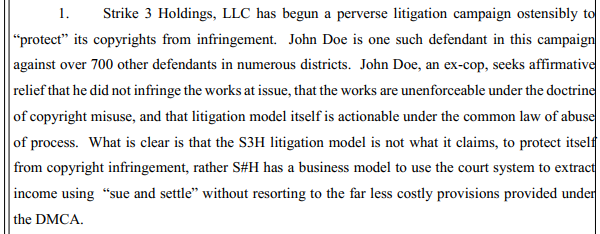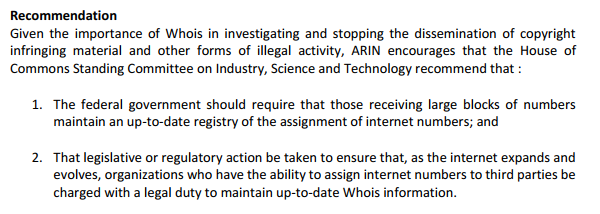Retired Police Officer Fires Back at ‘Copyright Troll’
jeudi 10 janvier 2019 à 22:29 As mentioned a few days ago, every year thousands of people are sued in the United States for online file-sharing, mostly through BitTorrent.
As mentioned a few days ago, every year thousands of people are sued in the United States for online file-sharing, mostly through BitTorrent.
The bulk of these cases are filed by two adult content producers, which are often referred to as “copyright trolls” or “porno trolls,” specifying the nature of their works.
These companies target people whose connections were allegedly used to download and share infringing videos, in the hope of obtaining a significant financial settlement.
While many of the defendants may have done the deed, quite a few of the accused Internet subscribers have done nothing wrong. This is also what a John Doe, known by the IP-address 73.225.38.130, argued in a recent court filing in a federal court in Seattle, Washington.
The defendant in question was sued over a year ago by Strike 3 Holdings, but he isn’t planning on settling. Instead, as the case progressed, the still unnamed man went on the offensive, helped by major law firm Fox Rothschild.
As it turns out, the adult company picked a fight with a 70+-year-old retired police officer. Following some initial pushback in court, Strike 3 Holdings was ready to let the case go. The company filed a motion to voluntarily dismiss all claims in August, but the “ex-cop” wasn’t willing to let them.
There were still several counterclaims pending and the defendant has built up a significant legal bill, which he doesn’t plan on paying himself. Instead, he wants to be found innocent and accuses the copyright holder of abuse of process. These counterclaims could go all the way up to trial.
With the tables turned, the retired policeman submitted amended counterclaims to the court last week, accusing the rightsholder of being engaged in a “perverse litigation campaign” against hundreds of defendants.
Strike 3 accused him of sharing dozens of copyrighted videos, but the man argues that he has never even heard of them.
“John Doe is a retired police officer in his 70’s. He has been married for over 40 years. Until he was sued by S3H, John Doe had never heard of the pornographic websites: ‘Blacked’, ‘Vixen’, or ‘Tushy’. John Doe does not know who downloaded these movies,” the document reads.
The man seeks a declaration of non-infringement, but also accuses the adult content producer of copyright misuse and abuse of process.
“John Doe, an ex-cop, seeks affirmative relief that he did not infringe the works at issue, that the works are unenforceable under the doctrine of copyright misuse, and that litigation model itself is actionable under the common law of abuse of process,“ the filing reads.
“What is clear is that the S3H litigation model is not what it claims, to protect itself from copyright infringement, rather S3H has a business model to use the court system to extract income using ‘sue and settle’ without resorting to the far less costly provisions provided under the DMCA.”
From the filing

The copyright misuse claims were dismissed previously, but Judge Thomas Zilly kept the counterclaims for a declaration of non-infringement and abuse of process alive.
According to the attorneys of the former policeman, there is no real legal dispute with Strike 3’s lawsuits, but “only a scheme to extort.”
The accused file-sharer argues that Strike 3 has filed hundreds of lawsuits, but if it was really interested in enforcing its rights, it would also use DMCA notices to alert ISPs and their customers of any infringing activity.
“S3H’s intentional failure to send DMCA notices to the ISP addresses of alleged John Doe defendants evidences an ulterior purpose to accomplish an object not within the proper scope of the process: extortion through sham litigation,” the filing reads.
“Filing a lawsuit with no intention of litigating evidences an ulterior purpose to accomplish an object not within the proper scope of process: extortion through sham litigation,” it adds.
Based on these and other arguments, the former policeman wants the adult production company to be held accountable for abuse of process. In addition, it also requests the declaration of non-infringement, with all fees and legal costs being compensated.
The court has yet to rule on the requests but it appears that the retired policeman has the upper hand, as Strike 3 previously indicated that they are willing to let the case go.
Whether the court will grant summary judgment, or if the case will be resolved through an alternative route, possibly a trial, has yet to be seen.
This case is not the only setback for the adult content producer either. In several recent cases the company was requested to provide “something more” than an IP-address as evidence of alleged infringement.
In addition, the IP-address geo-location tools which are crucial in these cases remain controversial as well. Just last month, a California federal court dismissed a request for an ISP subpoena, as there wasn’t sufficient evidence that an IP-address was tied to the court’s jurisdiction.
A copy of the second amended counterclaims is available here (pdf).
Source: TF, for the latest info on copyright, file-sharing, torrent sites and more. We also have VPN reviews, discounts, offers and coupons.




